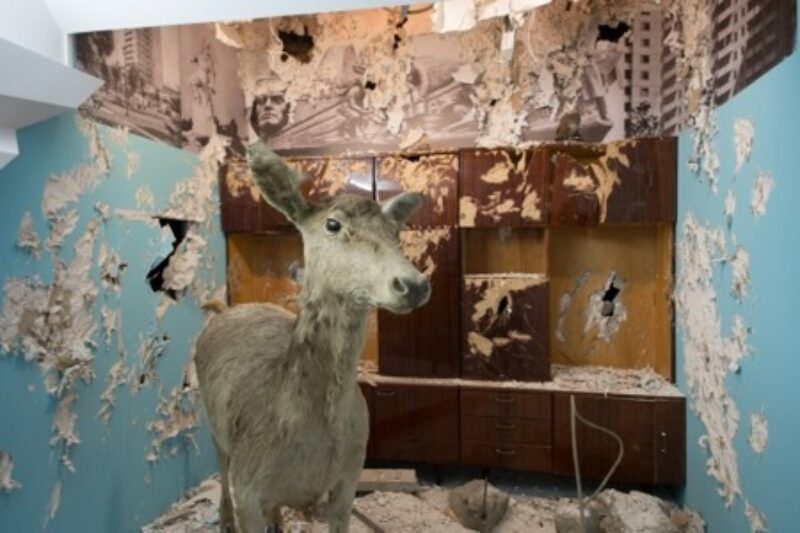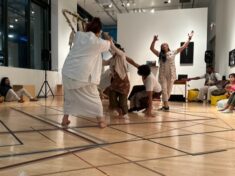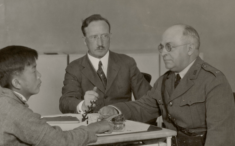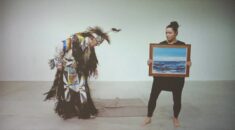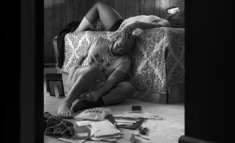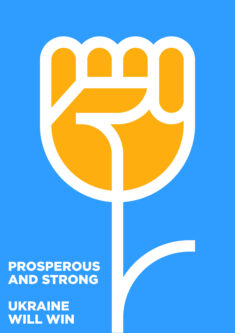About the event
This event takes place at MoMa. You must register for this online event here.
In this evening of presentations and conversations, artists, researchers, and curators will delve deeply into artistic responses to the war in Ukraine, looking at the period between the Maidan revolution—which was followed by the annexation of Crimea and the occupation of Donbas in 2014—and the full-scale Russian invasion launched on February 24, 2022.
Artists in Ukraine have long been reacting to the war. However, their voices seem only to have been amplified when the recent, brutal invasion started. Art created during the past eight years, and these very recent reactions, are already creating a future archive of the present that both documents the atrocities and proposes new narratives of art history.
What are the narratives created by these artists, and how have they shifted since the recent invasion? Can we use the framework of post-colonialism and decolonization to speak about art in Ukraine? Should we look at art history to understand the present and imagine a future beyond these violent events? While aspiring to think through these and other questions, the event will also serve as a forum for understanding how this research and these processes relate to museum practices around the examination of historical and theoretical questions in art history.
Art historian Svitlana Biedarieva will talk about the development and transformation of documentary practices in Ukrainian wartime art, analyzing works by Dana Kavelina, Vlada Ralko, Alevtina Kakhidze, and Yevgenia Belorusets. Researcher Ewa Sułek will expand on her proposition that what happened in the visual arts after 2014 can be called a “postcolonial turn”—a phenomenon based on healing and acceptance of history, and of the past in its hybrid form, without the imposition of imperial or national patterns. Artist Lesia Khomenko will discuss her practice, which is currently focused on ways of looking at the war and the relationship between digital archives and the materiality of painting. Nikita (Mykyta) Kadan will speak about Ukrainian avant-gardes and modernism, and their perception post-1991 and post-2014, as well as the (im)possibility of a “national avant-garde” and what looking at the avant-garde through a decolonial lens would mean. The event is moderated by Paulina Pobocha, Associate Curator, Department of Painting and Sculpture, and Inga Lāce, C-MAP Central and Eastern Europe Fellow.
Participants
Svitlana Biedarieva is an art historian, curator, and artist. Her current research focus is contemporary Ukrainian art, decoloniality, and Russia’s ongoing war against Ukraine. She also works on selected topics in Eastern European and Latin American art. Biedarieva holds a PhD in the history of art from the Courtauld Institute of Art, University of London. In 2019–20, she curated the exhibition At the Front Line: Ukrainian Art, 2013–2019 in Mexico and Canada. She is the editor of Contemporary Ukrainian and Baltic Art: Political and Social Perspectives, 1991–2021 (2021) and co-editor (with Hanna Deikun) of At the Front Line. Ukrainian Art, 2013–2019 (2020). Biedarieva has published critical texts on Ukrainian art in such academic and media outlets as October, ArtMargins Online, post at MoMA, Revue Critique d’Art, Financial Times, Hyperallergic, and The Art Newspaper, among others.
Ewa Sułek is an art historian, curator, writer, and a Fulbright Fellow at the Harvard Ukrainian Research Institute. She is the author of the book Chłopak z pianinem. O sztuce i wojnie na Ukrainie (The Boy with the Piano: On Art and War in Ukraine), as well as award-winning short stories and dramas. She is the recipient of the Fulbright Junior Research Award at Harvard University, a “Young Poland” National Centre for Culture scholarship in the field of visual arts, a ZAiKS scholarship in the field of literature, and an IAFOR (The International Academic Forum) academic scholarship. Together with Paweł Zaręba, she founded and runs the Lescer Art Center in Zalesie Górne, near Warsaw, Poland (lescer.org). Her new book, the drama Animals Who Ate Their Humans, was just published in Polish and Ukrainian.
Lesia Khomenko is a multidisciplinary artist who reconsiders the role of painting—deconstructing narrative images and transforming paintings into objects, installations, performances, or videos. Her interest lies in revealing tools of visual manipulation in the context of history-making and myth-making. She graduated from the National Academy of Fine Art and Architecture in Kyiv in 2004. A member of R.E.P. group since 2004, she is also a cofounder of the curatorial union HUDRADA, a self-educational community based on interdisciplinary cooperation. Khomenko is an initiator and program director of the Contemporary Art course at the Kyiv Academy of Media Arts. Her works have been shown in many exhibitions, including at the Lviv Municipal Art Center (2021), PinchukArtCentre, Kyiv (2018), MNAC, Bucharest (2016), and the Museum of Contemporary Art Kiasma, Helsinki (2015).
Nikita (Mykyta) Kadan studied monumental painting at the National Academy of Fine Art in Kyiv. He has been a member of the artist group R.E.P. (Revolutionary Experimental Space) since 2004 and has been a cofounder and member of HUDRADA since 2008. He received the Taras Shevchenko National Prize of Ukraine (2022), the Kazimir Malevich award (2016), a special Future Generation Art Prize (2014), and the PinchukArtCentre Prize (2011). He has been a participant in the Venice, Istanbul, Kyiv, and Busan biennials. His work can be found in the collections of such museums as Centre Pompidou and City of Paris Museum of Modern Art (Paris), Pinakothek der Moderne (Munich), MUMOK Museum Contemporary Art (Vienna), MuHKa Museum of Contemporary Art (Antwerp), Museum of Modern Art (Warsaw), and National Art Museum (Kyiv).
post presents: Art, Resistance, and New Narratives in Response to the War in Ukraine is co-organized with the Polish Institute in New York and cosponsored by the James Gallery at CUNY. Informative support is provided by the Harvard Ukrainian Research Institute.
post presents is a series of talks devoted to the cross-geographical consideration of modern and contemporary art. The sessions are an extension of post, MoMA’s online platform devoted to art from a global perspective. The Museum of Modern Art’s Contemporary and Modern Art Perspectives (C-MAP) initiative, of which post is part, is supported by The International Council of The Museum of Modern Art.
